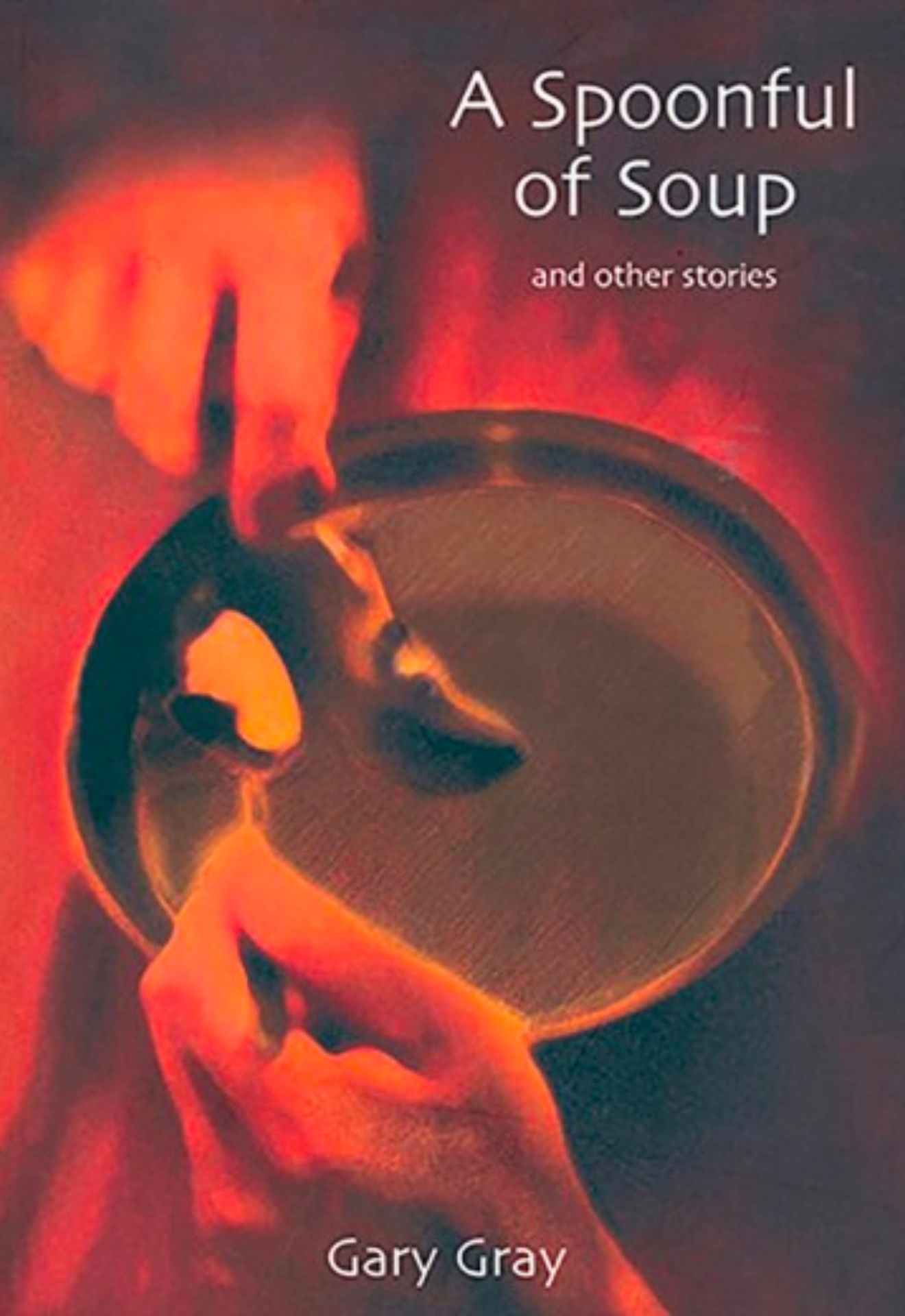That Gadget
| A short story by Melbourne writer Gary Gray. His simply written stories of life during war and survival have been widely acclaimed. |
|
Why am I looking at this, I asked myself – it has nothing to do with me. It is the shop itself – “I am here again for my regular inspection”, I say to Miki the owner, “It’s okay, go for your life”, he answers. Walking down the shop one can always see something new, a little shmonse or a gadget you didn’t see before. This time, however, I was standing there and listening and watching some video screened on the Plasma or LCD screen, advertising some gadget that a happy good-looking housewife is using to peel so many different fruits, vegetables, etc. with no effort whatsoever, leaving the almost transparent skin. Okay, but why does that contraption suddenly interest me? There is no reason for it – Oh yes, but there is a reason! |
| --o0o----o0o----o0o----o0o----o0o----o0o-- |
Winter of 1944 wasn’t kind to any of us in Katzetlager (concentration camp) Sportshule in the German district of Lower Silesia. Freezing in striped pyjamas, wet from the previous day’s snow or rain, with shmattes called onutzes around your feet, so hard to fit into the wooden clogs, hungry, running back to the barrack, not to miss that hot watery substance they called coffee, and then running for the rollcall in the Apel Platz hoping that this time they would not keep you for hours, if something doesn’t shtimt with counting the prisoners. I was going slowly on my downhill trip (using lager lexicon), losing rapidly resources of energy accumulated in previous camps, with the help of my friend Rosie, who, working in the lager kitchen, fed me with a bit of this and a bit of that to keep me out of the starvation process. In that downhill trip I always remembered David my old friend saying “Kopf Hoch, you have to fight HIM, THE ANGEL OF DEATH, who circles around all of us waiting for the appropriate moment to grab one under his deadly wings. You have to fight him and fight him”, repeated David countless times. In that misery I don’t think I could possible in my wildest dreams imagine that the beginning of the new year 1945 would suddenly present me with a life saving present, to which I contributed absolutely nothing. THE ANGEL OF DEATH must have lost his duel with some, let’s call him, ANGEL OF LIFE and so, with the help of a deputy Jewish lager commandant, Abramczyk (who knew me from previous lagers) I was selected to work in an attachment to the camp kitchen, called the sheil raum where a group of prisoners working under a roof – protected from freezing winder conditions – were preparing (peeling) potatoes or other food. Working under those conditions, with food around you, was a priceless gift, a lifesaver any prisoner could only dream about, an unreachable dream. Our daily target, for each of us, was to fill up a drum with 100 kgs of peeled potatoes. It wasn’t easy, although not impossible, but one stipulated condition was the quality of the peel, explained to me by David Blum before I started the new job. “What do you mean, the quality of the peel?” I asked. “It means the peel has to be thin, almost transparent.” “What’s this?” SS Helmut grabbed a handful of potato peel on the first day of my work. “What’s this?” he asked Kaplan our foreman. “Is this how deine juden work?” pointing to the not so transparent peel in his rotten hand. “All of you, out!” he commanded. We had to leave the shed and exercise on the Apel Platz with a punishment of one hundred or so push-ups. God forbid if you stopped for a second or lost your balance. You would get a kick from his shiny horse-riding boots, polished each morning by some lucky prisoner. Just the same, with all those punishments, we all knew that to lose this job would be catastrophic, probably a sentence leading to starvation and death. None of us could steal any potatoes out of the shed but you could slice a raw potato, stick it on the huge round iron stove, warmly glowing in the centre of the shed, fry and consume it, provided that no one will see it. In the corner of the shed, on some tripod, was installed a round rotating knife-sharpening tool on which you could sharpen the small knife with which you used to peel. Sharp or not sharp, the problem was the middle joint of your index finger, painful, swollen, and so often infected from constant day by day usage. It was in the middle of one night that I was woken up with a horrible pain in my index finger. It was dark in the barrack and I couldn’t see it, only when that horrible shout “Aufshtein!” that woke us up at 5 am so often interrupting our dreams that no SS or no kapo could take away from us. Only then I saw how badly infected that finger was, raw, bleeding, with a bit of pus around it. A cold panic sweat overcame me instantly. What will I do? An old domestic remedy came to my mind. We all knew that raw potatoes have some characteristic healing ingredients. If you had an inflamed finger from a wooden splinter not removed in time, you could drill a hole in a raw potato and insert your finger in it for a few hours or so and that would help. Even later in life, if any of my children had a similar problem I would prescribe the same remedy and it worked. Anyway, I said to myself that morning, when in the shed, I will cut a slice of raw potato and bandage it somehow around my finger, hoping of course that it would help. But what am I going to do, was in my mind, if it doesn’t work? My friend David warned me that morning, “Don’t say anything to anyone. Firstly, you may lose your job, in fact I am certain you would lose your job. Secondly, they will send you to the lager hospital.” Everyone knows that in a katzetlager the hospital has only the entrance with no exit. David is right, I said to myself, but what if I do nothing and some gangrene develops? Amputation came to my worried mind. Yes, I remember, it was in my first labour camp Birkenheim, not to be confused with Birkenau, our lager medic had to amputate the finger of David Sonenshein from Chrzanov. No proper anaesthetic, not even a local anaesthetic, only a chloroform spray, and a lot of alcohol. Someone else and I were selected for this procedure, to hold him strapped to a stretcher. What a horrible experience that was for me, a young teenager, imprisoned for only a few weeks. His screams echoed in my ears for weeks and weeks afterwards. Still, I listened to my friend and didn’t report it to anyone, not even Kaplan the foreman. Could any of us today, I ask you, try to peel a potato with a knife, using only the middle finger? You would say you couldn’t - almost impossible. But you can – it takes time and patience – you can! Somehow our old Mr Piltzer convinced our foreman to allow anyone who wanted, to peel together with his friend. When you finished the first drum you would start on the second. This way, you could at least talk to each other, provided of course, that both kept the same pace. That system was especially ideal for a father and son situation. The father could help his son if he was slower, or vice versa. The existing rule stipulated that no one could leave the sheil raum if one had fulfilled his own quota. You had to wait until everyone finished so it was customary to combine forces to finish the total target and go for a rest if it was possible. Solidarity, sacrifice or comradeship, was to the best of my memory not a characteristic in any slave labour camp, certainly not in a katzetlager. So, how surprised and touched I was when my friend David turned to me. “You know, Gustaw, maybe we can go for a partnership, I will try to work a bit harder to compensate your slower pace. This way, we can talk and no one will notice your dilemma, not the foreman, not anyone else. It will be safer this way.” “Yes, David”, I answered, “I will be happy to do it”, and we started that sheil raum partnership. My infected index finger healed, somehow, leaving only a mark I still have today, but our partnership didn’t last too long, unfortunately. It was interrupted by David, who started to cough. No one made a fuss but when he started to cough with blood, Cyril, one of our potato prisoners, who was a felczer (medical person) at home, approached our barrel and bent down to David. “This is serious, it’s TB. If you don’t get some help you will die quickly.” “I won’t go to the hospital, I won’t”, was his reply. Two weeks later he collapsed, was taken away, and later buried in a little forest just behind our camp. No one said kaddish after him. Soon after, when a Russian tank crashed through our lager gate, liberating us, a few of us from the sheil raum ran quickly to find Mr Orenstein, the French angel from Paris or maybe Antwerp (I don’t remember which), the one who ran a sort of quiet Chevra Kadisha and took part in burials. Our katzetlager was not an extermination camp. There was no mass murder, so we didn’t have mass graves, like elsewhere, so chances were that he would remember where David was buried. No, that lovely Mr Orenstein didn’t remember, but he said in his half-German half-French language, “I won’t find his grave but I will go with you. You know we can say kaddish at any spot where someone is buried. He will forgive you” he said, pointing his finger towards the sky. So we did. We stood in front of someone’s grave and quietly said kaddish. |
| --o0o----o0o----o0o----o0o----o0o----o0o-- |
Now, so many years later, standing in that shop, thinking how useful that gadget would have been in that ’45 winter, my mind, so to speak, revisited our sheil raum with David, Abramczyk, Orenstein, Rosie and a few others that contributed to my survival. Wiping away a tear or two, I left the store. |
| Gary Gray |
 Buy Gary's book "A Spoonful of Soup" |
| Back to the Gary Gray page |
| Back to the Authors page of Jewish Australia.com |



















